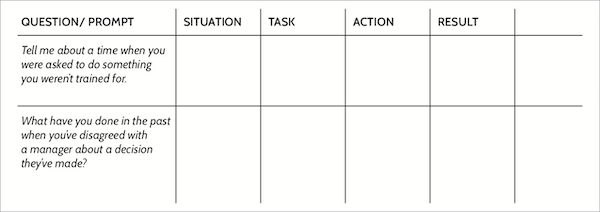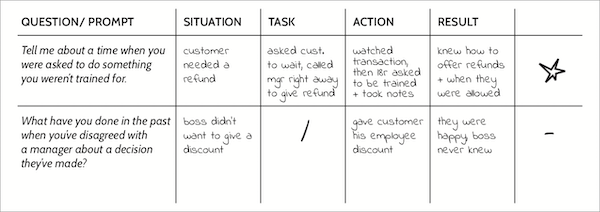The hiring process can be daunting. Whether you’re hiring for the first time or already have a stable of pros on your team, finding new people to join the herd doesn’t come with an instruction manual. But we’ve found that having a few tools in your tool chest can make a big difference.
First of all, make sure you’ve really fine-tuned your job description BEFORE you start the hiring process. Outline tasks this person will do, qualities they need to have in order to be successful, and the experience required. Having a clear sense of who you’re looking for is a big step in helping you find them!
Next, make sure you’ve got a compelling job ad that describes this person you’re dreaming about. Infuse your company personality and culture into the ad. Be sure to give specific instructions for how someone should apply… send their resume to a certain email address? Include a cover letter and salary requirements? Make sure to add three references? Whatever you want, ask for it at this point. This is the first step in finding out who can follow instructions. If they don’t send your three requested references or email the right address, you can automatically weed them out as someone who isn’t a good fit.
Your goal with a job ad is to get more qualified candidates than you have jobs for, right? So, make sure you really spread the word. Post on social media, email 25 contacts personally with the job ad and ask them to pass it along to anyone they may know who would be a good fit. Find out how to post it at local colleges or on job boards like Indeed, LinkedIn, etc. Send the job ad to your most connected/connecting contacts. Don’t be afraid to get it out there. The more qualified applicants you get, the better options you’ll have when it comes to do the actual hiring.
Now, it is interview time.
While it would great if everyone could describe themselves, their potential, and their values succinctly in an interview, sometimes it isn’t that easy. That’s why behavioral interviewing is such a game-changer. Essentially, this is a process of having interviewees describe their past behavior since it can be a great predictor of future performance.
A good behavioral interview includes questions or prompts that start like this:
-Tell me about a time when …
-What have you done when …
-Give me an example of …
-Describe a …
Make sure that when you come up with your list of questions, you’re highlight the qualities and characteristics you wrote down in the job description above. If you’re looking for someone with dependability, you might ask “Tell me about a time when someone relied on you at a job.” If you need someone who can think on their feet, ask, “What have you done in the past when you’ve encountered a change of plans or an unexpected obstacle in an urgent or time sensitive situation?”
Once you’ve got a list of questions ready, go ahead and make them into a chart like this:

Having these questions at the ready when you’re interviewing will set you up for success.
After introductions and a little getting-to-know-you time, transition into the STAR portion of your interview. Explain to the candidate that you will be asking questions and you want them to respond by describing…
(S) a particular situation,
(T) the task they had to complete or goal they were working towards,
(A) the specific action that they personally took,
(R) and the results.
Be sure to explicitly tell the interviewee that you’re looking for each of these four components. Be clear that you want actual details, not just hypotheticals or generalizations.
Then dive right into Question 1. You can repeat again that you are looking for the Situation, Task, Action, and Results.
And now you listen. See if they can be specific. Are they able to tell you about something that actually happened or just how they might act? Can they pinpoint their task and the personal action they took? Or are they using “we” or “they” language? Do they recognize what the results were? Or did they not even notice what came of their actions?
Take notes during this process with the goal of filling in each square for each question.
Remember that this exercise is about seeing if they can take in your directions and follow them in addition to hearing the content of their answers. As they answer, if they completely answer a question, you can make a star then move on to the next question. If they aren’t able to answer a particular aspect of a question or didn’t answer the question in a way that is satisfying to you, make a mark to indicate that in your chart.

If the applicant has a hard time answering in your format, feel free to interject “I just want to remind you that I’m looking for you to describe a specific situation, the task or goal you were working toward, the specific action you took, and the result.” After three questions with that kind of prompting and reminders, if they still can’t follow your format, end the interview. This is an indication they won’t be able to follow other kinds of direction you give them if they were to get the job.
Once you concluded your interviews, having this chart for each of your interviewees is going to make narrowing down who to hire SO MUCH EASIER. Because you’ll have an objective measure of who understood your directions, could answer your questions, and notes about their answers, you’ll be able to see how they compare to one another.
Even if you “clicked” with Susie, or you thought Janie has a lot of potential, looking at their interview charts, you’ll be able to take another perspective. You can read through your notes again to see if they really have the integrity you’re looking for or if they’ve demonstrated dependability in the past. You don’t just have to rely on your gut reactions or your memory of how friendly they were.
We hope that implementing STAR interviewing in your event rental business will help you find more qualified candidates, walk into interviews confidently with a plan that you can repeat, and help you hire with more success.
And don’t forget to save your question template for your next round of hiring. No need to reinvent the wheel… your future self will thank you!

